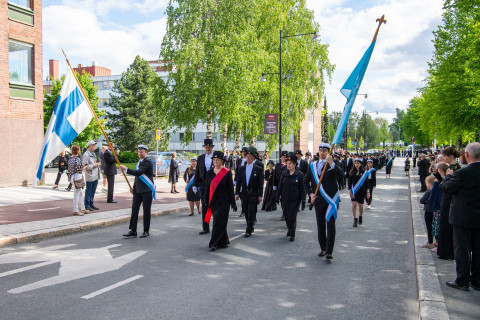The doctoral conferment festivities in Kuopio culminated in the ceremonial conferment of degrees at the Music Centre in Kuopio on Friday. Doctorates were conferred upon 122 doctoral graduates as well as upon 13 honorary doctors. For the first time in a long while, the conferment procession was seen on the streets of Kuopio.

Initially planned for the summer of 2020, the doctoral conferment ceremony has been postponed by two years due to the coronavirus pandemic. “May the fact that we are now, once again, able to get together bring us special joy and happiness of reunion,” said Rector Jukka Mönkkönen in his address at the ceremony.
He reminded the audience that the ceremonial conferment of doctoral degrees is not only the most prestigious academic celebration, but also a strongly communal ceremony. “In the doctoral conferment ceremony, doctoral graduates of the University of Eastern Finland become part of a long academic tradition, and honorary doctorates are conferred upon major influencers from the realms of science and society.”
“Although science is international and global by nature and although the main goal of universities is to be internationally successful, the significance of regional interaction should not be ignored. The university's doctoral conferment ceremonies have always attracted plenty of public attention, and the festivities are visible in the cityscape throughout the event. In my opinion, this is a small but significant part of the university's regional impact – after all, it reinforces the image of the campus cities as a home to the university. May the doctoral procession walking through the city this afternoon serve as a festive symbol of this relationship.”
“Achieving a doctorate is a moment of career choice for many. Should one become a researcher or do something else,” said Professor Emeritus Jukka Pelkonen, who served as the Head Conferrer of Degrees.
According to Pelkonen, doctoral researchers are a very important resource in sustaining every university’s research, and a doctoral degree is also useful in non-research positions.
“I would emphasize the requirement for doctoral education as an important part of our society's expert tasks, so that the information we receive is based on research and critical reflection,” Pelkonen said, referring to the flood of unverified information in recent years, especially on social media.
Universities have made efforts to create more favorable conditions for research work that has previously been labelled as temporary and precarious, and the University of Eastern Finland has been a pioneer in improving the position of scholarship researchers. “You are the best to judge how successful our own university has been in this mission,” Pelkonen told the promovendi.
In the ceremonial conferment of degrees, doctoral graduates obtain the right to use the insignia associated with their academic status, which at the University of Eastern Finland are the doctoral hat, the university’s own doctoral emblem, and the doctoral diploma.
In this years’ doctoral conferment ceremony, doctorates and honorary doctorates were conferred by the three faculties operating on the Kuopio campus. Professor Kari Lehtinen acted as the Conferrer of Degrees for the Faculty of Science and Forestry, Professor Emeritus Jukka Pelkonen for the Faculty of Health Sciences and Professor Kaija Saranto for the Faculty of Social Sciences and Business Studies.

The Prima Doctor explained the risks of fetal chemical exposure
Isabell Rumrich, MSc, was the first doctoral graduate upon whom a doctorate was conferred in the ceremony. As the Prima Doctor, her duty was to demonstrate the learnedness of the doctoral graduates by answering a question posed by a professor in her field. The question posed by Professor Emeritus Matti Viluksela was why chemical exposure during pregnancy is potentially harmful to the fetus.
According to Rumrich, there are at least 3 important factors that explain the vulnerability of the fetus to chemical exposures. “First, the fetus is likely to be exposed to the same chemicals as the mother and the placenta does not give full protection. Second, the embryonic and fetal development in general and organogenesis in particular are the most sensitive life stages for external stress factors. Therefore, exposure levels that are not harmful for adults may be harmful to the fetus. Third, effects of chemicals that take place during fetal development are often permanent in contrast to exposure to the same chemical during postnatal life resulting typically in reversible effects.”
Pasi Hirvonen, DSocSc, was the last doctoral graduate upon whom a doctorate was conferred in the ceremony. As the Ultimus Doctor, his duty was to give a speech to the guests of honour in the banquet and ball taking place later in the festivities. Traditionally, Primus and Ultimus Doctors are selected by the Young Doctors’ Committee. Both are doctoral graduates who have passed their doctoral defence with distinction.
Honorary doctorates were conferred upon Secretary General Petteri Taalas, Professors Alan J. Grodzinsky, Erkki Somersalo, Ralf Zimmermann, Kim L.R. Brouwer, Pekka Vallittu, Gabriël J.E. Rinkel, Masayuki Yamamoto, Anne Marie Rafferty and Zhao Fang, Dance Artist, Professor Jorma Uotinen, Director Patricia Flatley Brennan as well as Director General Mikko Helander.
After the ceremonial conferment of degrees and the procession, the festivities continue with an ecumenical conferment service, a banquet and a ball, and a cruise on Lake Kallavesi on Saturday.

For further information, please contact:
Conferment Ceremony Coordinator Kirsi Bykachev, kirsi.bykachev (a) uef.fi, tel. +358503634819



